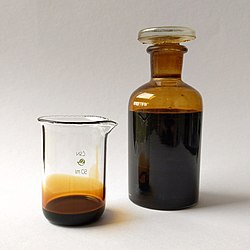
Back Ruolie Afrikaans Erdöl ALS ፔትሮሊየም Amharic Petrolio AN نفط Arabic ܢܦܛܐ ARC پيطرول ARY بترول ARZ Petroleu AST Нарт AV
Petroleum, also known as crude oil or simply oil, is a naturally occurring, yellowish-black liquid chemical mixture found in geological formations, consisting mainly of hydrocarbons.[1] The term petroleum refers both to naturally occurring unprocessed crude oil, as well as to petroleum products that consist of refined crude oil.
Petroleum is a fossil fuel formed over millions of years from anaerobic decay of organic materials from buried prehistoric organisms, particularly planktons and algae, and 70% of the world's oil deposits were formed during the Mesozoic.[2] Conventional reserves of petroleum are primarily recovered by drilling, which is done after a study of the relevant structural geology, analysis of the sedimentary basin, and characterization of the petroleum reservoir. There are also unconventional reserves such as oil sands and oil shale which are recovered by other means such as fracking.
Once extracted, oil is refined and separated, most easily by distillation, into innumerable products for direct use or use in manufacturing. Petroleum products include fuels such as gasoline (petrol), diesel, kerosene and jet fuel; bitumen, paraffin wax and lubricants; reagents used to make plastics; solvents, textiles, refrigerants, paint, synthetic rubber, fertilizers, pesticides, pharmaceuticals, and thousands of other petrochemicals. Petroleum is used in manufacturing a vast variety of materials essential for modern life,[3] and it is estimated that the world consumes about 100 million barrels (16 million cubic metres) each day. Petroleum production played a key role in industrialization and economic development,[4] especially after the Second Industrial Revolution. Some petroleum-rich countries, known as petrostates, gained significant economic and international influence during the latter half of the 20th century due to their control of oil production and trade.
Petroleum is a non-renewable resource, and exploitation can be damaging to both the natural environment, climate system and human health (see Health and environmental impact of the petroleum industry). Extraction, refining and burning of petroleum fuels reverse the carbon sink and release large quantities of greenhouse gases back into the Earth's atmosphere, so petroleum is one of the major contributors to anthropogenic climate change. Other negative environmental effects include direct releases, such as oil spills, as well as air and water pollution at almost all stages of use. Oil access and pricing have also been a source of domestic and geopolitical conflicts, leading to state-sanctioned oil wars, diplomatic and trade frictions, energy policy disputes and other resource conflicts. Production of petroleum is estimated to reach peak oil before 2035[5] as global economies lower dependencies on petroleum as part of climate change mitigation and a transition towards more renewable energy and electrification.[6]
- ^ "EIA Energy Kids – Oil (petroleum)". www.eia.gov. Archived from the original on July 7, 2017. Retrieved March 18, 2018.
- ^ Donev, Jason. "Oil formation". Energy Edication, University of Calgary. Retrieved April 13, 2025.
- ^ Krauss, Clifford; Mouawad, Jad (March 1, 2011). "Libyan tremors threaten to rattle the oil world". The Hindu. Chennai, India. Archived from the original on March 6, 2011.
- ^ "The Economic Benefits of Oil & Gas". Department of Energy. Archived from the original on March 31, 2024. Retrieved March 31, 2024.
- ^ Bullard, Nathaniel (December 9, 2021). "Peak Oil Demand Is Coming But Not So Soon". BNN, Bloomberg News. Retrieved December 11, 2021.
- ^ R, Tom; all; Warren, Hayley. "Peak Oil Is Already Here". Bloomberg.com. Archived from the original on December 18, 2020. Retrieved December 31, 2020.
© MMXXIII Rich X Search. We shall prevail. All rights reserved. Rich X Search


